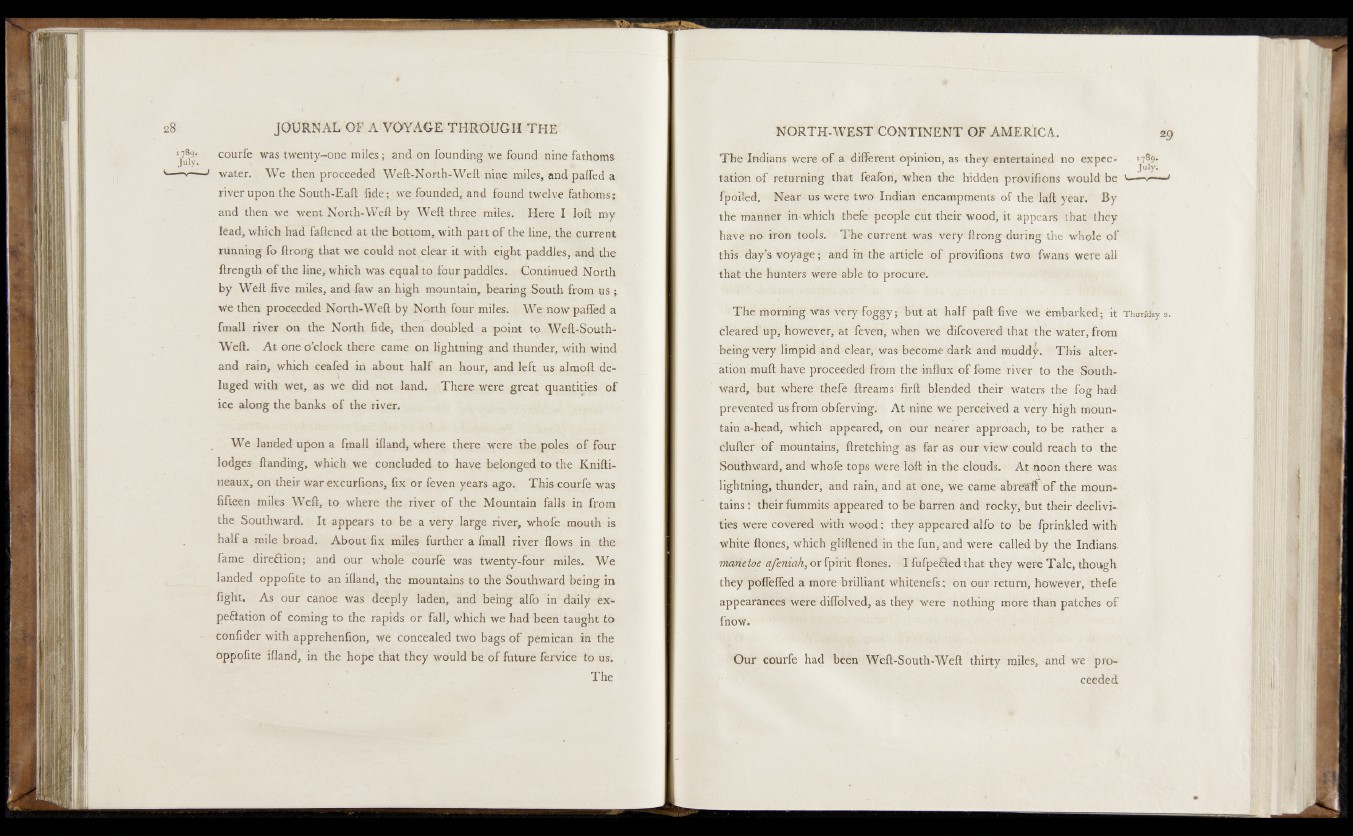
courfe was twenty-one miles; and on foundfttgjvet found nine fathoms
water.. We then proceeded Weft-North-Weft nine miles, and palled a
river upon the SoUth-Eaft fide; wg fouetded^and found twelve fathoms ;
and then, we went North-Weft by Weft three miles: Here I loft my
Mad, which had fattened a t the bottom, with part of the liner thev.current
running fo ftrong that we could not clear it with eight paddles, and the
ftrength o f the line, which was eqnalto four paddle^,,-» \Qontinued! North
by Weft-five miles, and law an high mountain, bearing, South, fromg ns ;
We then proceeded North-Weft by -North four miles.; a We now patted a
fmall river on the North fide, then doubled a point to- WefLSouth-
Weft. At one o’clock there came on, Hghtoing and thunder, with, wind
and rain, which cealed in about half an hour, and k ft us. almoft deluged
with wet, as we did not land. There were great quantities of
ice along the banks o f the river.
We landed upon a fmall ifland, where there were the poles of four
lodges (landing, whkh we concluded to have belonged lap fie Koifti-
neaux, on their war excurfions, fix orfeven yea's, ago- Xhi^Gourfe-was
fifteen toilfes Weft, to where the river ©f from
the Southward. It appears to be a very large driven, whofe mouth is
half a mile-broad. About fix miles further a fmall river .flows in. the
fame dire&ion; and our whole courfe was twenty-four miles. We
landed oppofite to an ifland, the mountains to the Southward being in
As our' cab^d Was* deeply laden, and being alfo in daily ex*,
peffation of coming to the rapids or fall, which we had been taught to
confider with apprehenfion, Wd concealed two bags of pemican in the
oppofite ifland, in the hope that they would be of future fervice to us.
The
The Indians were o f a different opinion, as they entertained no expec-
taridh Of, rettfMmg tfewt fetfoh, when the Mddeii prdvifions would be
{polled. Near us were two India® encampments of the laft year. By
the manner ift'Which thnfe pesplfe ^ht ^hek wood, it appet£S that-they
have wo iron tools. The current was very ftrong during the whole of
tMs day’s Vtoyage 5 and in the ariiefe o f provifions two fwans were all
<hat;the hunters were able, to procure.
Thd morning Was v'try foggy ;• but at half paft five '*we embarked; it
cleared up, however, at feven, when we difeov-ered thatthe water, from
•beihg vefy linfvpid and elear,; was become dark and muddy. This alteration
muffc have proceedetH-Vom the «influx of forme river to the Southward,
but where ’thefe ftreams' firft^blendeft their' waters’ the fog had
prevented- us-frcwm ob-ferving. At -nine We perceived a very high mountain
»-head, which appeared, otf our nearer approach, to be rather a
clutter of mountains, ftretchin.g'; as far as our view-could reach to the
SMthwaid, andwhefetops were/ldft in the clouds. Ajt -poon there was:
lightning, thunder, and rainy and! at one, we came abröïft o f the mountains
: theirfummits appëarefi' to be barren and rocky^ but their deelivi-
ties were covered with wood: they’appeared5a lfo to -be fprinkled with
white Homes, whichgli-ftened in the fun, and were called by the Indians
ffifflietoc <&fóniah, o¥ Ipirit ftones. T föfpeéted that they were Talc, though
they poffeffed a more brilliant whitenefs: on our-»return, however, thefe
appearances were diffolved, as they were nothing more than patches of
'fftöW.
Our courfe had been Weft-South-Weft thirty miles, and we proceeded